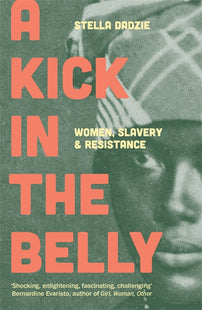A Kick in the Belly: a Letter from the Editor
"From this meticulously researched and beautifully written book emerges not only an account of the experiences of enslaved women, but of their stubborn insubordination, their tireless resistance and the crucial role they played in rebellions, small and large." – Rosie Warren, Verso editor, on the publication of A Kick in the Belly.

The first time Stella and I met face to face was at a packed-out launch event for our 2018 republication of The Heart of the Race, the book co-written by Stella, Beverley Bryan and Suzanne Scafe, in our Feminist Classics series. After their talk, Stella told me that she’d been working on another book for a long time, and asked whether I’d be interested in taking a look at it. Where The Heart of the Race was a powerful rebuttal to a version of Britain’s history from which black women have long been excluded, reclaiming and recording black women’s place in that history, A Kick in the Belly looks at the experiences of enslaved women in the West Indies.
In the UK, two hundred years after Abolition, popular discourse continues to focus on the actions of conscience-stricken white men, if it acknowledges slavery at all. That a statue of slave trader Edward Coulston still stood in Bristol, until it was finally toppled and rolled into the sea this summer by #BlackLivesMatter protesters, is a clear indication of Britain’s failure to engage with its own ugly history. As Stella writes in the introduction: ‘Whisper the S-word on this side of the pond and, bar a handful of guilt-stricken universities, there is a collective squirm of embarrassment in the national seat. Mention reparations and politicians fudge or grow defensive.’ But even where the actions of the enslaved take centre strange, so often it is a story in which the specific experiences and actions of enslaved women are sidelined or entirely absent.
From the earliest European descriptions of intransigent Maroons heading for the hills to latter-day accounts of slave rebellions, black women have been largely conspicuous by their absence. On the rare occasions when they are mentioned, they tend to be viewed through the lens of a depressingly long tradition of academic misogyny, bolstered by some pretty crude and predictable sexual stereotypes. Such perspectives have fuelled the notion of enslaved women as wanton and compliant … that women had it easier under slavery because they spent so much of it on their backs.
A Kick in the Belly ought put a stop to such a narrative, for good. Dadzie follows a trail from Elmina Castle in Ghana and the horrors of the Middle Passage, as slaves were transported across the Atlantic, to the sugar plantations of Jamaica and beyond. In the first chapter the reader is introduced to women like Ana Nzinga, queen of Ndongo, a ‘formidable opponent, a fearsome woman who remained a flea in the ear of the Portuguese throughout her thirty-year reign’ and Yaa Asantewaa, who ‘would have been around sixty when she was elected to lead an army of 5,000 in the Ashanti war of resistance against the British at the turn of the twentieth century.’ The book moves from the specific role women played in resisting capture and enslavement in Africa to the middle passage, where Dadzie reminds us that revolt was common (even according to the few records that survive, one in ten voyages experienced some form of revolt or mutiny). Perceived as less of a threat, women and children were often left unshackled, putting them ‘in an ideal position to plan, urge or help instigate revolt’. Those who survived the journey faced ‘systemic, gendered brutality’ in the Americas. Dadzie documents, through a series of themed chapters, the conditions of women’s enslavement: the regimes of punishment and coercion they endured, the dynamic role women played in slave rebellion and resistance, and the problem of reproduction.
On every page, we find evidence of enslaved women’s tactics for subversion. We meet women who played an extraordinary role in resistance to slavery, like Asante Nanny the Maroon, who guided the rebel forces in the Blue Mountains during the First Maroon War, and whose ‘leadership of the Windward Maroons in what was later called Nanny Town earned her a fearsome reputation … She organised successful raids on local plantations, seizing food and weapons and freeing many hundreds of slaves.’
From this meticulously researched and beautifully written book emerges not only an account of the experiences of enslaved women, but of their stubborn insubordination, their tireless resistance and the crucial role they played in rebellions, small and large. As Bernadine Evaristo puts it; ‘A Kick in the Belly reframes the overwhelmingly male perspective on the transatlantic slave trade through female experiences and acts of resistance. It is an essential corrective to centuries of sublimation and the presentation of black women who lived through this history as passive victims.’
Rosie Warren, Verso Editor
London, 2020.
A Kick in the Belly: Women, Slavery and Resistance by Stella Dadzie is one of our October Book Club reads: a carefully curated selection of books that we think are essential and necessary reading. Find out more about our Book Club here.
[book-strip index="1" style="buy"]“Shocking, enlightening, fascinating, challenging, A Kick in the Belly reframes the overwhelmingly male perspective on the transatlantic slave trade through female experiences and acts of resistance. It is a essential corrective to centuries of sublimation and the presentation of black women who lived through this history as passive victims. I cannot recommend it highly enough.” – Bernardine Evaristo, author of Girl, Woman, Other
